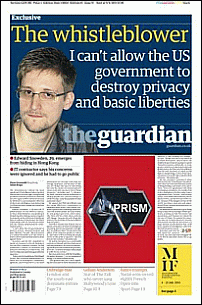Edward Snowden: The ‘Messiah’ Who Won You A Pulitzer And Himself A Halo

A carnival float depicting US president Obama putting whistleblower Edward Snowden on an electric chair prior the traditional carnival parade in Duesseldorf, western Germany, on Monday, March 3, 2014. The foolish street spectacles in the carnival centers of Duesseldorf, Mainz and Cologne, watched by hundreds of thousands of people, are the highlights in Germany’s carnival season on Rosemonday. (AP Photo/Martin Meissner) Date: 03/03/2014
WHAT is your view on the Pulitzer Prize committee awarding their prize for Public Service to The Washington Post and The Guardian for featuring Edward Snowden and his haul of National Security Agency documents?
What did you make of it? Right? Wrong?
Pulitzer said the award was for the “revelation of widespread secret surveillance by the National Security Agency”.
Honoring the NSA reporting — particularly in the coveted category of Public Service — would inevitably be perceived as a political act, with the Pulitzer committee invoking its prestige on behalf of one side in a bitter national argument. In effect, it would be a rebuttal to prominent establishment voices in both parties who say that Snowden’s revelations, and the decision by journalists to publish them, were the exact opposite of a public service. President Barack Obama has said that Snowden’s leaks “could impact our operations in ways that we may not fully understand for years to come.” Former Vice President Dick Cheney has called him “a traitor.” Snowden, who is living in Russia, is facing three felony charges in a criminal complaint filed by the Justice Department.
Yet to pass on the NSA story would be to risk giving the appearance of timidity, siding with the government over the journalists who are trying to hold it accountable and ignoring the most significant disclosure of state secrets in recent memory.
Peter Weber saw a slight:
The Washington Post, whose articles were written by national security reporter Barton Gellman, was commended for its “authoritative and insightful reports that helped the public understand how the disclosures fit into the larger framework of national security.” The Guardian, whose original coverage was helmed by Glenn Greenwald, was congratulated for “helping through aggressive reporting to spark a debate about the relationship between the government and the public over issues of security and privacy.”
That sounds like a polite way of noting that The Guardian‘s initial coverage was less careful than The Washington Post‘s, and that The Post corrected its errors when they became apparent. Or that there’s a fine line between journalism and impassioned advocacy, and while both are important to a democratic society, Gellman (below, left) and Greenwald (center) are perhaps on different sides of that divide.
Fair point? The Guardian moved its masthead down to make way for the sainted Snowden’s face.

It reminded us of this scene in The Commitments:
As Brendan O’Neill observed:
This wasn’t news reporting; it was a secular beatification, an invitation to readers to look into the eyes of St Snowden, the latest in a line of brave revealers of liberal gospel, who, according to one Guardian columnist, has carried out ‘extraordinary human acts’ and showed ‘an endless willing to self-sacrifice’ – just like You Know Who. The creepy Jesus allusions are even more apparent in the Twittersphere, where Snowden is referred to as saviour, martyr, even ‘libertarian messiah’.
Guardian readers’ editor Chris Elliott:
“In the UK there had been little noticeable change in attitude to the Guardian’srevelations – at least in the media – until the British Press Awards on 2 April 2014, where the Guardian won newspaper of the year and also received the award for its website. Given the feelings of some editors it was a generous decision.The Guardian is still absorbing the lessons of the NSA stories but a point that [Alan] Rusbridger now emphasises in public talks, especially to journalism students, is that reporters, regional or national, must learn the basics of encryption if they are to protect sources. Before the Snowden revelations, that would have seemed eccentric.”
Melanie Phillips, The Times:
“The Pulitzer prize, America’s most prestigious award for public service journalism, has just been given to the The Guardian and The Washington Post for publishing leaked material about western intelligence-gathering supplied to them by the fugitive former National Security Agency contractor, Edward Snowden. Yet these disclosures are regarded within defence and security circles as one of the greatest acts of treachery ever committed in the West…The reaction to Snowden is an example of what I think of as the West’s auto-immune disease: turning on its allies and defenders while embracing its foes. With this Pulitzer, a self-destructive pathology seems to have been awarded its own perverse prize.”
Posted: 27th, April 2014 | In: Reviews Comment | TrackBack | Permalink


